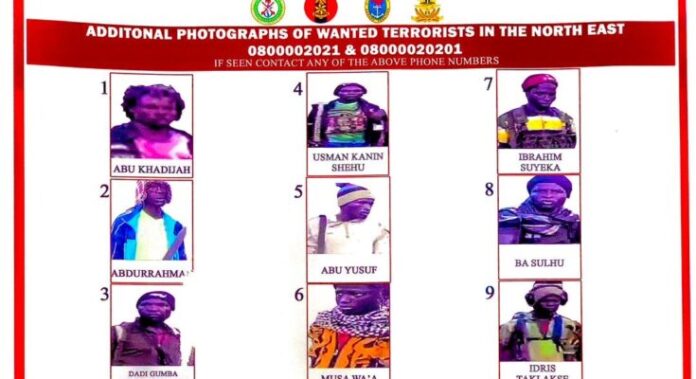In a bold move to combat rising terrorism in Nigeria’s North-East, the Defence Headquarters (DHQ) has released a fresh list of nine wanted terrorist leaders, further intensifying efforts to restore peace in the region.
During a press briefing on Thursday in Abuja, Major General Edward Buba, the Director of Defence Media Operations, unveiled the names of high-profile figures believed to be masterminding the deadly insurgencies that have plagued the region for years.
The names on the list include some of the most notorious terrorist leaders operating across the country. Among them are Abu Khadijah, Abdurraman, Dadi Gumba (also known as Abbu Muhammel), Usman Kanin Shehu, Abu Yusuf, Musa Wa’a, Ibrahim Suyeka, Ba Sulhu, and Idris Takleksa. These individuals are accused of orchestrating numerous attacks, spreading fear, and contributing to the insecurity that has destabilized much of northern Nigeria.
“This list highlights the continued effort of the Nigerian military to identify and apprehend those responsible for the suffering of innocent Nigerians,” said Major General Buba. “We are calling on the public to assist in providing vital information that will help us locate and neutralize these individuals.”
The announcement came as part of the government’s renewed commitment to enhancing security across the country, especially in areas severely affected by the insurgency. Major General Buba emphasized that the military cannot achieve success alone and that the cooperation of local communities is critical in the fight against terrorism.
“We need the help of everyone, especially the local people who are often the first to know when terrorist groups are operating in their areas,” Buba added. “Your involvement in reporting suspicious activities will be crucial in ridding the nation of these violent elements.”
This latest development is in line with the government’s ongoing efforts to tackle terrorism and restore peace to the North-East, a region that has long been the epicenter of violent extremism in Nigeria. While security forces have made significant strides in containing insurgent activities, challenges remain in dismantling the vast networks of terrorist groups that continue to operate in the region.
The unveiling of these nine wanted individuals underscores the government’s determination to hold accountable those who have caused so much harm to the nation. It also signals the continued pressure on the terror networks that have terrorized local populations, with the Nigerian military increasing its operations to bring these individuals to justice.
However, the country’s security challenges are far from over. In a related update, Major General Buba also revealed the emergence of a new terrorist group known as ‘Lukarawas,’ which has escalated security concerns in the northwestern region of Nigeria.
The Lukarawas group is said to have infiltrated northern Sokoto and Kebbi states from neighboring Niger, following a breakdown in military cooperation between Nigeria and Niger due to the recent political crisis in Niger. Before the coup, Nigerian and Nigerien security forces had been cooperating in joint border operations that helped curb terrorist activities in the region.
According to Buba, the suspension of border collaborations allowed the Lukarawas terrorists to exploit difficult terrain and infiltrate remote areas, where they have spread their radical ideology. “The terrorists took advantage of the gaps in cooperation between both countries and used the difficult terrains to launch attacks in some northwestern states,” Buba explained.
The emergence of Lukarawas has added a new layer of complexity to Nigeria’s battle against terrorism. Initially, some local communities mistakenly welcomed the terrorists, believing they were there to help. This lack of awareness and failure to report suspicious activity allowed the group to gain a foothold in these areas before the full extent of the threat was realized.
Despite this setback, Buba assured the public that the Nigerian military is employing sustained intelligence, surveillance, and reconnaissance (ISR) operations to locate and neutralize the Lukarawas group. “Our troops are actively conducting operations to track and dismantle these new terrorist cells,” he said.
However, Buba also noted that the group continues to exploit remote, under-governed regions to evade military forces and harass local populations. The rugged terrain and lack of effective governance in some areas have made it difficult for the military to fully eradicate the threat.
“This is not a battle we can win overnight, but we are determined to push back these terrorists and restore peace to our communities,” Buba stated. “We will continue to enhance our operations and work closely with local authorities and communities to identify and eliminate these threats.”

